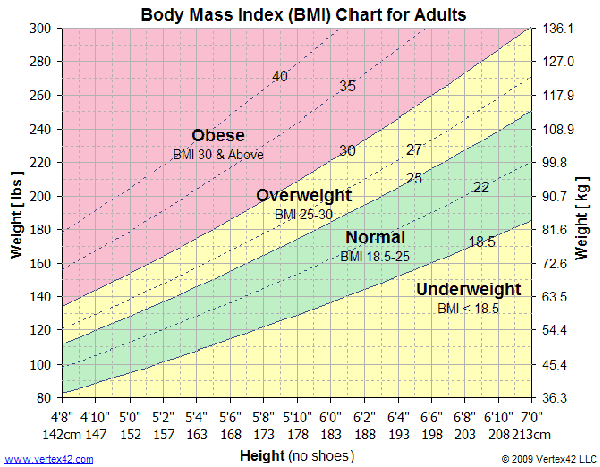Obesity is a medical condition in which an excessive accumulation of fat in the body leads to adverse effects on health. Obesity is increasingly viewed as a public health problem and may lead to a shorter life expectancy or an increase in other health problems. Excessive body weight increases the risk of various other diseases such as cardiovascular diseases, sleep apnea, type 2 diabetes and osteoarthritis, among others.
The Body Mass Index (BMI) is a widely-used tool for measuring body fat based on an individual's weight and height. To calculate the BMI, the individual's body weight is divided by the square of the individual's body height. The resulting unit of measure is kg/m2.

You can calculate your BMI easily online.
The National Institutes of Health recommends that individuals with a BMI of 40 or greater may be considered for bariatric surgery. Individuals with a BMI of 35 to 40 and a co-morbidity such as hypertension, diabetes, sleep apnea or high cholesterol may also be recommended for bariatric surgery.
Treatment options for obesity
The first line of treatment for obesity consists of diet and exercise. The patient should alter the diet, often under the guidance of a nutritionist, and increase physical activity.
Diet restriction may produce weight loss over the short term, but that weight loss is often difficult to maintain. Obese patients may also be prescribed weight loss drugs to assist with diet and exercise, but these drugs are often associated with a high incidence of adverse effects.
For patients who have tried and failed to lose weight using traditional methods, and whose weight is putting them at risk for other health problems, it may be time to consider bariatric surgery.
Please note that bariatric surgery is performed for health reasons only and is not a form of cosmetic surgery. It is only recommended for people with serious health conditions related to their weight.
Bariatric surgery
The term "bariatric surgery" encompasses all of the surgical treatments for obesity. In these procedures, weight loss is achieved by reducing the size of the stomach. This can be done in a variety ways, including by implanting a medical device (gastric banding or gastric balloon), removing a portion of the stomach (sleeve gastrectomy), or by resecting and re-routing the small intestines to a small stomach pouch (gastric bypass surgery).
Bariatric surgery is used to help severely obese patients reach and maintain a healthy weight. Surgery to treat cases of severe obesity is associated with a high success rate and decreased overall mortality. Studies show that such these procedures can result in significant loss of weight, recovery from diabetes, improved cardiovascular risk factors and decreased mortality.
The decision for surgery depends on clinical evaluation of the individual and existing treatment modalities. All patients undergoing surgery first require counseling regarding the outcome of surgery and the importance of lifestyle improvements. While determining the eligibility for bariatric surgery of morbidly obese patients, psychological screening is critical. It is also important for determining postoperative success.
Treatment for obesity in Germany
At Premier Healthcare Germany, we understand that obesity is a complex illness and we recognize the need for experienced, multidisciplinary care. That's why we work together with some of Europe's leading obesity specialty centers.
At the Obesity Center of Asklepios Westklinikum Hamburg, experienced gastric surgeons perform more than 100 laparascopic (minimally-invasive) bariatric surgical procedures per year, where possible with single-port-access through the navel leaving no surgery scars. An interdisciplinary team of medical professionals is available to offer patients additional consulting and support. The center is highly qualified and has certifications from several German quality seals and medical institutions.
At Asklepios Westklinikum, treating physicians can include specialists in the areas of cardiology, gastroenterology, endocrinology, diabetology, dietology, psychology and physical therapy. Together, they will help the patient not just lose weight, but also focus on other health indicators to make sure there is an overall improvement in the patient's health. Careful patient selection, extensive preparation and long-term post-surgical support lead to excellent patient outcomes for obesity procedures at this center.
Contact us for more information.
